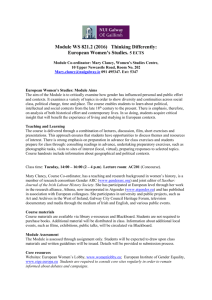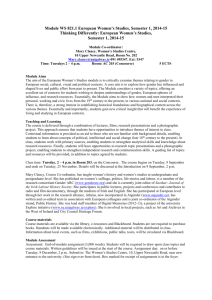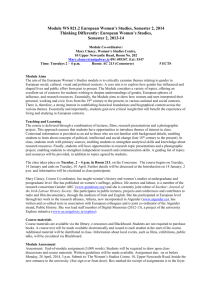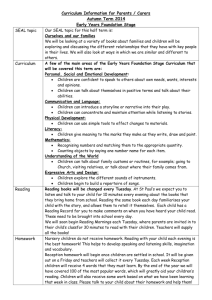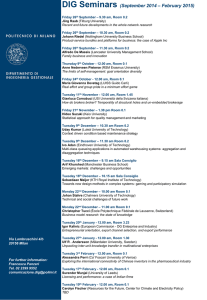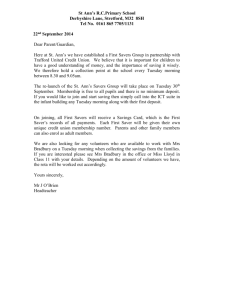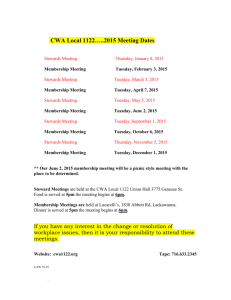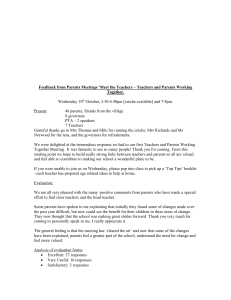Module WS 821.1 (2015) Thinking Differently: European Women`s
advertisement
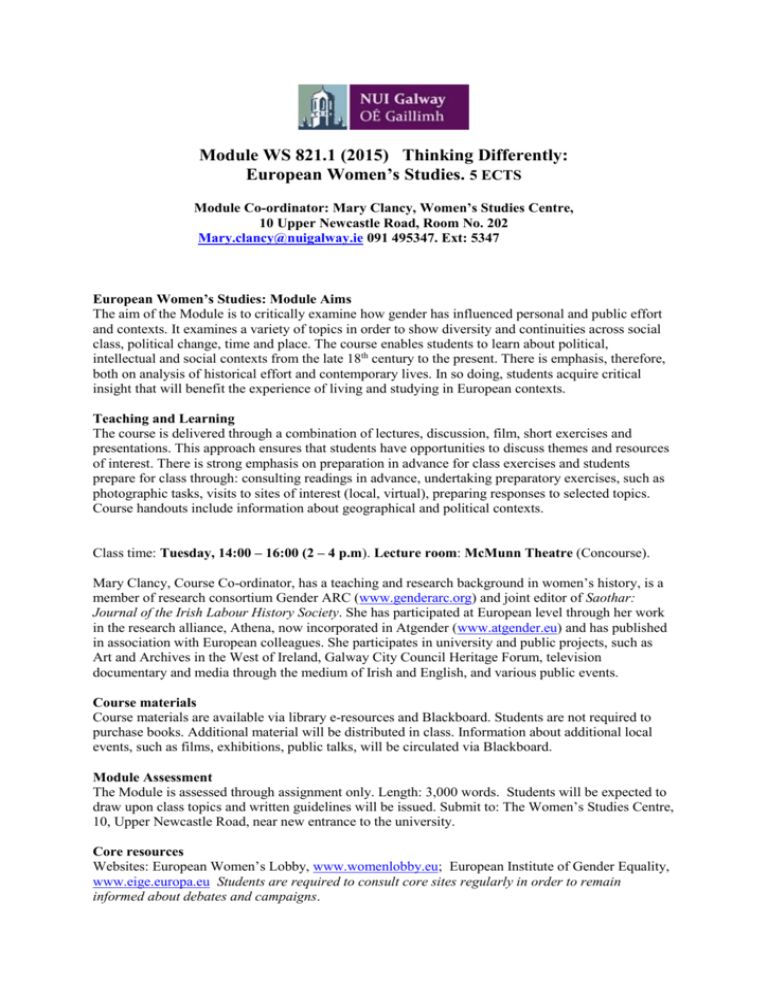
Module WS 821.1 (2015) Thinking Differently: European Women’s Studies. 5 ECTS Module Co-ordinator: Mary Clancy, Women’s Studies Centre, 10 Upper Newcastle Road, Room No. 202 Mary.clancy@nuigalway.ie 091 495347. Ext: 5347 European Women’s Studies: Module Aims The aim of the Module is to critically examine how gender has influenced personal and public effort and contexts. It examines a variety of topics in order to show diversity and continuities across social class, political change, time and place. The course enables students to learn about political, intellectual and social contexts from the late 18th century to the present. There is emphasis, therefore, both on analysis of historical effort and contemporary lives. In so doing, students acquire critical insight that will benefit the experience of living and studying in European contexts. Teaching and Learning The course is delivered through a combination of lectures, discussion, film, short exercises and presentations. This approach ensures that students have opportunities to discuss themes and resources of interest. There is strong emphasis on preparation in advance for class exercises and students prepare for class through: consulting readings in advance, undertaking preparatory exercises, such as photographic tasks, visits to sites of interest (local, virtual), preparing responses to selected topics. Course handouts include information about geographical and political contexts. Class time: Tuesday, 14:00 – 16:00 (2 – 4 p.m). Lecture room: McMunn Theatre (Concourse). Mary Clancy, Course Co-ordinator, has a teaching and research background in women’s history, is a member of research consortium Gender ARC (www.genderarc.org) and joint editor of Saothar: Journal of the Irish Labour History Society. She has participated at European level through her work in the research alliance, Athena, now incorporated in Atgender (www.atgender.eu) and has published in association with European colleagues. She participates in university and public projects, such as Art and Archives in the West of Ireland, Galway City Council Heritage Forum, television documentary and media through the medium of Irish and English, and various public events. Course materials Course materials are available via library e-resources and Blackboard. Students are not required to purchase books. Additional material will be distributed in class. Information about additional local events, such as films, exhibitions, public talks, will be circulated via Blackboard. Module Assessment The Module is assessed through assignment only. Length: 3,000 words. Students will be expected to draw upon class topics and written guidelines will be issued. Submit to: The Women’s Studies Centre, 10, Upper Newcastle Road, near new entrance to the university. Core resources Websites: European Women’s Lobby, www.womenlobby.eu; European Institute of Gender Equality, www.eige.europa.eu Students are required to consult core sites regularly in order to remain informed about debates and campaigns. Note: Classes will begin on 15 September. Venue: McMunn Theatre on the Concourse. Tuesday, 15 September, 2015. Introduction and contexts Topic: Introductions and course information. Defining European identities and questions. Review: women and gender. Forgotten Women. Topical Matters. Handouts. Tuesday, 22 September. Women’s Suffrage and Equal Citizenship Topic: This session will trace the granting of votes to women throughout Europe during the early 20th century. Class analysis: suffrage and anti-suffrage documents and visual materials. Tuesday, 29 September. National and Imperial Citizenships Topic: This session examines questions of women’s social and political rights in European nation states, especially post-revolutionary contexts. Class analysis of discourses, visual and symbolic texts. Tuesday, 06 October. Public Powers and Personal Rights (1) Topic: This session will examine social and personal questions, state and voluntary institutions. Casestudy: the Magdalen Asylum. Analysis of narratives, visual evidence and public artefacts. Tuesday, 13 October. Hidden and Hard Labour Topic: This session examines working-class lives and topics such as child labour, domestic service, sweated labour, trade-union organising, emigration, forced and hidden labour. Film. Tuesday, 20 October. Women’s Voices in Politics Topic: This session examines questions of interest to political women in late 20th and early 21st century Europe, using their own words and actions. Exercise: writing politics. Tuesday. 27 October. Public Powers and Personal Rights (2) Topic: This session examines equality and the status of so-called minority groups in Europe, Asylum Seeking, Trafficking. Discuss: Lives of Travellers and Roma. Tuesday, 03 November. Images and Visual Representations Topic: This session examines the place of art– artefact, documentary, sound, visual - as central to expression, identity, representation and change. Art and Activism. Tuesday, 10 November. Class Presentations. Topic: Students will make small-group presentations on agreed topics. Instructions will be issued and groups organised some weeks in advance of the class. Tuesday, 17 November. Post-Soviet Europe Topic: This session examines developments in post-soviet European countries (post-1989): Memories in Writing and Film. Film extracts in class. Tuesday, 24 November. Assignment Ideas and Resources. Writing the assignment. Students will have prepared progress reports, including outline of assignment idea and list of resources, as per guidelines issued earlier in Semester. Module Review. Submit assignment by: Tuesday, 8 December, 2015, 3 p.m. A full outline, with readings and guidelines, will be distributed to students on registration for the course in September. Mary.clancy@nuigalway.ie July, 2015
